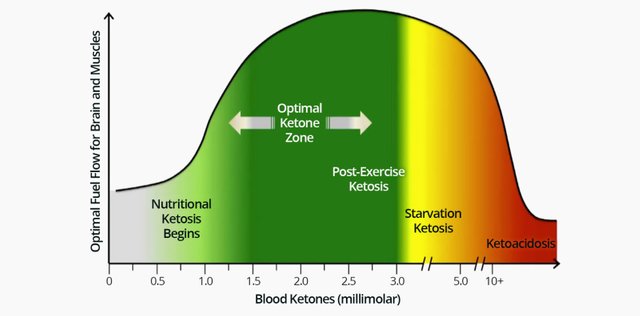Monitoring Ketones

In this article I address the simple question: If you are on a ketogenic diet, should you be regularly monitoring your ketone levels—whether temporarily or for the rest of your life?
To answer this question, I will be drawing on the excellent research carried out in this field by Michael Berta, a contributor to the website Ketogains. This extensive site, the brainchild of Luis Villaseñor and Tyler Cartwright, even boasts the motto: Chase Results Not Ketones. I highly recommend both their website and the associated reddit.
Michael Berta’s article on the Ketogains website bears the title Why I Stopped Testing My Ketones on a Ketogenic Diet, which speaks for itself. According to Berta, there are several very good reasons for not continuing to monitor your ketones after the initial few months. Here are the principal ones.

1 Ketones or Fatty Acids
While it is true that your body will burn ketones for energy when you initially starve it of carbohydrates—ie immediately after adopting a ketogenic diet—this situation only lasts for the first few weeks. Eventually your body will learn to reserve the ketones for the brain, while your heart and skeletal muscles come to rely more and more on free fatty acids. Training your body to burn fatty acids for energy is the primary goal of the ketogenic diet, and this is achieved by restricting dietary carbohydrates. The production of ketones is actually a secondary effect.
2 Peetones or Ketones
As we saw in the preceding article in this series, one of the cheapest and easiest ways of measuring your ketones is by peeing on a urine strip (Ketostix). If you are a newbie, this is a good way of checking that your ketogenic diet is working. The problem is that you are detecting ketones—specifically acetoacetate, or AcAc—that the body is excreting. In the initial weeks, the body has not yet become keto-adapted (fat-adapted), and so a lot of the ketones that the liver produces spill over into the urine. But once you have become keto-adapted, so few ketones will be excreted by your kidneys that the concentration of AcAc in your urine may be undetectable.
3 Cost
Even if you use a blood monitor to measure the concentration of the ketone body beta-hydroxybutyrate (BHB) in your blood, there is still the cost to take into account. Blood ketone strips cost approximately $1 or €1 each ($2-4 per strip according to Berta) and are not reusable, so every time you test yourself, there is a cost involved—not to mention the drawing of blood. If, on the other hand, you decide to monitor your breath ketones (acetone or Ace) using a Ketonix, your initial investment will exceed $100—though no strips are required, so there are no significant running costs.
4 Correlation
In the preceding article, I suggested that there is a good correlation between blood concentrations of BHB and breath concentrations of Ace, but Berta disputes this. He even quotes the inventor of the Ketonix to this effect: Blood ketones and breath ketones do not correlate well with each other. I’ve confirmed this by testing blood and breath side by side. I’ve had high blood ketones but low breath ketones. I’ve had high breath ketones but low blood ketones. Berta’s own experience bears out the truth of this. Whether you monitor the concentration of BHB in your blood or of Ace on your breath, the measurement returned may not be an accurate reflection of your state of ketosis.

You can read Michael’s article for more information on this subject. The moral of the story is that you do not need to monitor your ketones—perhaps, even, that you should not monitor them. Even in the initial stages of your ketogenic diet, you can simply follow the diet—the bottom line being the restriction of dietary carbs—and trust that it will get you into ketosis and help you to become keto-adapted. Of course, in order to ensure that you are actually following a ketogenic diet, you may want to calculate your macros. This is something we will look at in the next article.
Ketones or Glucose
Instead of monitoring your ketones, you would be better advised to monitor your blood glucose levels. This will tell you how many net carbs your body can tolerate without a spike in blood sugar and insulin, or what effect fibre has on your metabolism, or what artificial sweeteners do to your metabolism, etc. This is a very important subject, and one to which I will return in a later article.
But I’m in this for the long haul ...
References
- Jeff S Volek, Stephen D Phinney, The Art and Science of Low Carbohydrate Living, Beyond Obesity LLC (2011)
- Jeff S Volek, Stephen D Phinney, The Art and Science of Low Carbohydrate Performance_, Beyond Obesity LLC (2012)
- Jacob Wilson, Ryan P Lowery, The Ketogenic Bible: The Authoritative Guide to Ketosis, Victory Belt Publishing, Las Vegas (2017)
Image Credits
- Glycolysis, Nutritional Ketosis and Therapeutic Ketosis: MyKetoKitchen, after Volek & Phinney, The Art and Science of Low Carb Living, Fair Use
- Mike Berta: © Michael Berta, Fair Use
- Blood vs Breath Ketone Comparison: © Michael Berta, Fair Use
Online Resources

✌✌✌